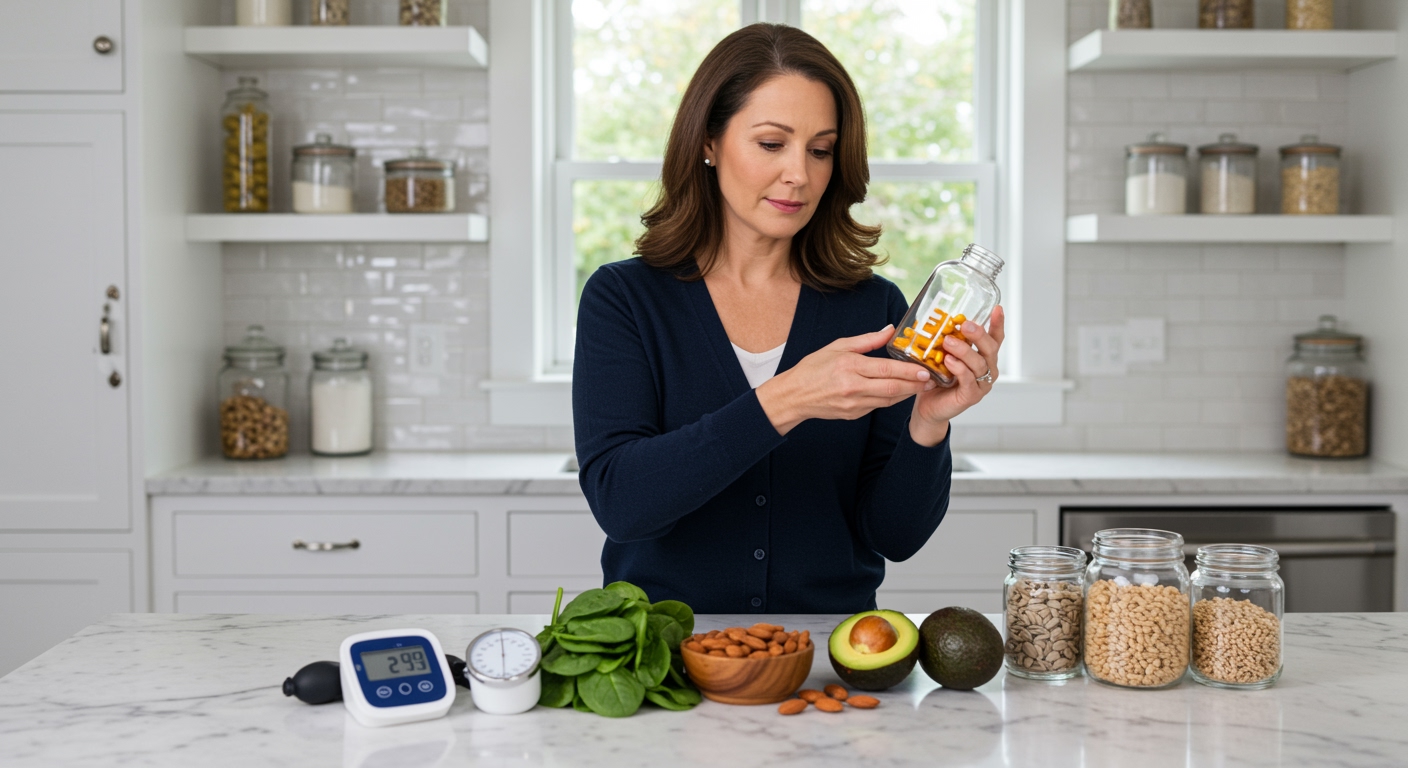✪ Key Takeaway: Vitamin E does not directly lower blood pressure and may actually increase it in some people with existing heart conditions.
Introduction
Your doctor just told you that your blood pressure is too low, and now you are wondering if vitamin E supplements might help.
Many people believe that vitamin E can fix low blood pressure problems, but this common assumption might be leading you down the wrong path.
Hi, I am Abdur, your nutrition coach, and today I am going to explain the real relationship between vitamin E and blood pressure so you can make informed decisions about your health.
What Does Vitamin E Actually Do to Blood Pressure?
Vitamin E works as a powerful antioxidant in your body, protecting your cells from damage caused by free radicals.
This fat-soluble vitamin helps maintain the health of your blood vessels by preventing oxidation of cholesterol and reducing inflammation in your arterial walls.
However, research shows that vitamin E does not have a direct blood pressure lowering effect like many people believe.
In fact, some studies suggest that high doses of vitamin E supplements might actually cause a slight increase in blood pressure in certain individuals.
The confusion comes from the fact that vitamin E supports overall cardiovascular health, which people mistakenly interpret as blood pressure regulation.
✪ Fact: Vitamin E primarily protects blood vessels from damage rather than directly affecting blood pressure readings.
Can Vitamin E Supplements Raise Your Blood Pressure?
Research indicates that taking high doses of vitamin E supplements can potentially increase blood pressure in some people.
A study published in the American Heart Association journal found that people taking 400 IU or more of vitamin E daily experienced a small but measurable rise in systolic pressure.
This effect appears to be more pronounced in individuals who already have cardiovascular disease or diabetes.
The mechanism behind this increase involves vitamin E interfering with the normal function of nitric oxide, a compound that helps blood vessels relax and maintain proper pressure.
Additionally, synthetic vitamin E supplements may compete with other important nutrients in your body, creating imbalances that affect blood pressure regulation.
If you have low blood pressure and are considering vitamin E supplements, this potential for pressure increase might seem beneficial, but it is not a reliable or safe treatment approach.
✪ Pro Tip: Never use vitamin E supplements as a treatment for low blood pressure without consulting your healthcare provider first.
Should You Get Vitamin E From Food Instead?
Getting vitamin E from whole food sources is always safer and more effective than taking isolated supplements.
Foods rich in vitamin E include nuts like almonds and hazelnuts, seeds such as sunflower seeds, and vegetable oils like wheat germ oil.
These natural sources provide vitamin E in a balanced form alongside other complementary nutrients that work together synergistically.
Unlike supplements, food sources of vitamin E are unlikely to cause the blood pressure increases seen with high-dose synthetic versions.
Green leafy vegetables like spinach and broccoli also contain moderate amounts of vitamin E along with other nutrients that support cardiovascular health.
The natural form of vitamin E found in foods is more easily recognized and utilized by your body compared to synthetic supplements.
✪ Note: A handful of almonds provides about 7 mg of natural vitamin E, which is nearly half your daily requirement.
What Really Helps With Low Blood Pressure?
If you have low blood pressure, focus on proven strategies rather than relying on vitamin E supplements that may not help.
Increasing your salt intake moderately can help raise blood pressure, but this should be done under medical supervision.
Staying properly hydrated is crucial because dehydration is one of the most common causes of low blood pressure.
Eating smaller, more frequent meals can prevent the postprandial hypotension that occurs when blood pressure drops after large meals.
Regular physical activity helps improve circulation and can gradually help normalize blood pressure over time.
Compression stockings may help prevent blood from pooling in your legs, which is especially helpful if you experience orthostatic hypotension when standing up.
✪ Pro Tip: Drinking 16 ounces of water 15 minutes before standing can help prevent blood pressure drops in sensitive individuals.
The Bottom Line
Vitamin E supplements are not an effective treatment for low blood pressure and may actually cause blood pressure to increase in some people.
The best nutrition approach focuses on proven solutions rather than popular misconceptions, and this principle applies perfectly to the vitamin E and blood pressure relationship.
I would love to hear about your experiences with blood pressure management or any questions you might have about vitamin E in the comments below.
References
At NutritionCrown, we use quality and credible sources to ensure our content is accurate and trustworthy. Below are the sources referenced in creating this article:
- PubMed: Vitamin E supplementation and cardiovascular events in high-risk patients
- American Heart Association: Effects of vitamin E on cardiovascular and microvascular outcomes
- Frontiers in Endocrinology: Vitamin E and metabolic health





